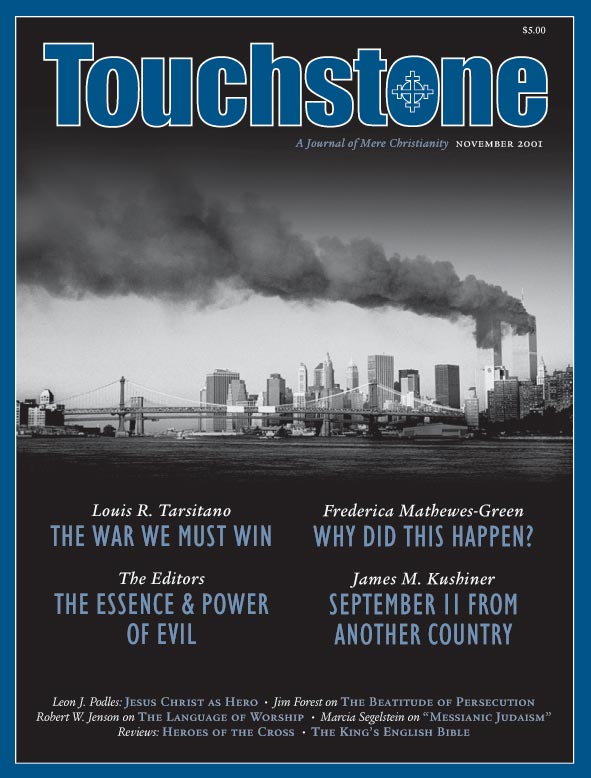Caught Between Root & Branch
“Messianic Judaism”—Can There Be a Middle Ground?
by Marcia Segelstein
According to some, nothing less than the Holy Spirit is at work in a recent movement of Jews who have become Christian but wish to remain “fully Jewish.” According to others, it is nothing more than a thinly veiled attempt by Evangelical Christians to convert Jews to Christianity.
Messianic Jews, as they call themselves, believe in Jesus, preferring to call him Yeshua. They worship in traditional Jewish ways and bristle at the term “conversion.” Most Messianic Jews eschew the term “Christian” because it has become synonymous with the term “gentile.”
Unlike Jews for Jesus, which set out to convert Jews to Christianity and, for the most part, assimilate them into gentile churches, Messianic Jews feel strongly about not giving up their Jewish lifestyle and style of worship—and aren’t afraid to say so. One group, the Chosen People Ministries, ran a full-page ad in the New York Times showing a photo of 15 people above a caption that reads: “Is it reasonable to be Jewish and believe in Jesus? We think so!”
Their critics disagree. According to Mark Powers, National Director of Jews for Judaism, “Someone born of a Jewish mother may be Jewish to begin with, but if they opt out of the Jewish faith system, they opt out. These people have opted out. . . . You cannot be both Jewish and Christian at the same time. It’s a contradiction in terms.” To Powers and other Jewish critics, Messianic Judaism is just one more attempt to convert Jews to Christianity. For them, telling Jews they can remain Jews, retain all of their Jewish traditions and practices, and at the same time believe in Yeshua is intrinsically deceptive.
Ancient Separation
Unlike the vast majority of mainstream Jews and Christians, Messianic Jews believe there is no contradiction here. They point to Jewish Christians of the first century as role models. Up until the destruction of the Temple by the Romans in A.D. 70, the Jewish Christians had continued to participate in Temple worship.
Following the fall of Jerusalem in A.D. 70, the only Jewish sect left standing, besides the Jewish Christians, was the Pharisees. Under the leadership of Rabbi Yohanan Ben Zakkai, they adapted Judaism for life without the Temple. Pharisaic Judaism eventually became Rabbinic Judaism, and the basis for modern Orthodox Judaism. One of the tenets of this new Judaism was that it would not include believers in Jesus. References to Yeshua in the Talmud, compiled in the fifth and sixth centuries, are all hostile.
At the same time, the Church was becoming more gentile and further removed from its Jewish roots. The Council of Nicaea in 325, called by Constantine, clearly distanced the Church from Jewish practice. Constantine wrote in a letter to those not present at the council: “We ought not, therefore, to have anything in common with the Jews . . . and . . . we desire, dearest brethren, to separate ourselves from the detestable company of the Jews.”1
In 787 the Second Council of Nicaea stipulated in its Eighth Canon that “Hebrews ought not to be received unless they have been converted in sincerity of heart.” It reads,
Marcia Segelstein is a part-time writer and full-time mother. A former senior producer for CBS News, she is a contributing editor for Salvo, and has written for First Things, OneNewsNow, and Worldmag.com.
subscription options
Order
Print/Online Subscription
Get six issues (one year) of Touchstone PLUS full online access including pdf downloads for only $39.95. That's only $3.34 per month!
Order
Online Only
Subscription
Get a one-year full-access subscription to the Touchstone online archives for only $19.95. That's only $1.66 per month!
bulk subscriptions
Order Touchstone subscriptions in bulk and save $10 per sub! Each subscription includes 6 issues of Touchstone plus full online access to touchstonemag.com—including archives, videos, and pdf downloads of recent issues for only $29.95 each! Great for churches or study groups.
Transactions will be processed on a secure server.
more from the online archives
calling all readers
Please Donate
"There are magazines worth reading but few worth saving . . . Touchstone is just such a magazine."
—Alice von Hildebrand"Here we do not concede one square millimeter of territory to falsehood, folly, contemporary sentimentality, or fashion. We speak the truth, and let God be our judge. . . . Touchstone is the one committedly Christian conservative journal."
Support Touchstone
—Anthony Esolen, Touchstone senior editor









